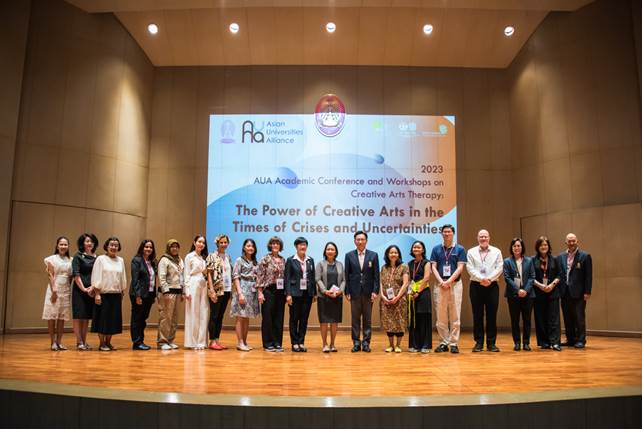
Academic Conference on “The Power of Creative Arts in the Times of Crises and Uncertainties” was held in Chulongkorn University in Bangkok, Thailand on March 9th-10th, 2023. Chulongkorn University is one of the Universities in the Asian Universities Alliance that has started a masters degree program in Art Therapy at its Faculty of Fine and Applied Arts. The conference touched upon the themes of Art Therapy that is an innovative form of healing for Thai Society and ASEAN region at large. The main objectives of the conference were to instill and raise awareness about the power of expressive arts as a therapeutic healing, promote university-level cooperation promote curriculum development of the nascent degree program in higher education.
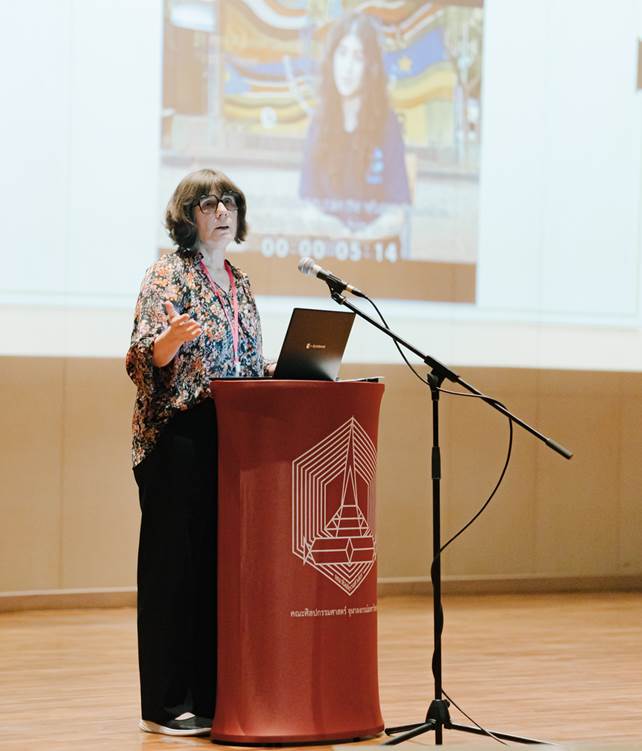
Dr. Rachel Lev-Wiesel delivered a keynote address
The conference aimed to promote the sharing of knowledge and experiences regarding the use the creative and expressive process of artmaking to improve and enhance the physical, mental, emotional, and social wellbeing of individuals; and to promote university-level cooperation by sharing long-term visions related to creative art therapy for the purpose of developing a curriculum and a degree program in higher education institutions. As such, the collaboration among the AUA member universities was encouraged, not only to broaden its academic program collaborations but also to expand its future business potential and its application and practice for societal benefit.
The organizer of the conference emphasized that encouraging collaboration with people from diverse backgrounds and culture could play a key role in changing the mindsets of students and citizens, challenging them to be more open-minded and to think outside the box. This would promote practices for sustainability. It was also noted that learning the exemplary case studies (research, practices and experiences) shared by representatives from University of Colombo, Universitas Indonesia, Universiti Malaya, Nazarbayev University, Peking University, and National University of Singapore, this conference could serve as the unique starting point of the collaborative projects, leading to the future of art therapy and music therapy as a more widely practiced social entrepreneurship. The exchanges during the Roundtable Discussion included the below.
●Academically, adding art therapy and music therapy as a part of the curriculum for students can be of a great benefit. Due to the mental health issue that has become detrimental to people in societies worldwide, future collaboration in cross-cultural research and publication will undoubtedly provide new insight into the world of every psychology-related field. This collaboration can be a driving force to push for positive changes.
●Regarding creative art therapy courses in various institutions and countries, Prof. Rachel Lev-Wiesel pointed out that creative art therapy has evolved from being solely an art form to a science that collaborates with other fields such as AI, medicine, hyperbaric treatment, and neuroscience. Research indicates that there is a correlation between the traumatic brain and its response to art therapy. The Emili Sagol Research Center for Creative Arts Therapy in Israel is equipped with a large hyperbaric therapy dome and other scientific instruments that can measure changes in body systems and neural activity during therapy, including a recently developed helmet made by NASA. She said that the purpose of these studies on creative art therapy was establishing an evidence-based discipline toward clinical practice and policy.
●It was shared that in Indonesia, art and culture are integral components of daily life. Although there are university programs in both Psychology and Arts, there are currently no cross-cutting collaborations between the two disciplines to create a creative art therapy program that could serve as a promotive and preventive treatment for the mental health of the general population.
●Similarly, it was confirmed that Nazarbayev University in Kazakhstan does not offer a degree in art therapy, but the practice is implemented in the university’s wellness center, and efforts are underway to extend these services to the wider community. This is especially critical in light of the increasing rate of suicide among students and the elderly in Kazakhstan, with gender-based violence being one of the key issues affecting these communities.
●In the case of China, which is rich in minority cultures, it was shared that Peking University offers several cultural art therapies, such as Taoist Cognitive therapy and Mongolian mind-body interaction therapy. Although there is no degree in art therapy, Western school psychotherapy is also being used in practice.
●In Sri Lanka, art is included in the medical curriculum at Colombo University to address a lack of empathy and compassion observed in medical students, likely due to the highly competitive and challenging nature of the medical program. To promote empathy and understanding of society and patients, arts and humanities are incorporated into the curriculum, and students are encouraged to participate in artistic activities and classes, such as the Colombo Medical Orchestra and Colombo Medical Choir.
●The National University of Singapore (NUS) has various initiatives related to art therapy. NUS' primary policy is to cultivate the next generation of entrepreneurs, prepare students with mindsets and experiences for startups, and provide ecosystems and support for these endeavors. NUS startups include businesses in the mental/wellness and arts-related spaces, such as Mangrove Learning (a Taiko drumming school), Mindfi (a mental wellness application), Meetarts (a c2c e-commerce visual arts platform for artists and art buyers), and Lucid Experience (an immersive experience company focusing on experience design). The presenter shared that NUS recognizes the importance of mental health and provides mental support for students with mental health issues. Additionally, NUS collaborates with Chulalongkorn University to exchange students, where Thai students with cultural strengths can learn about business ideas as well as cooperate with those from different cultures and strengths.
●Prof. Bussakorn Binson shared her experience in Thailand when she and her team led by Prof. Lev-Wiesel conducted art therapy workshops with villagers in Northeast Thailand. The workshops were organized after a tragic shooting incident at a local daycare center where more than 30 children were killed. The workshops were aimed at helping parents cope with trauma through the use of art therapy, which proved to be more effective than traditional counseling sessions. By bringing together individuals with similar experiences, the workshops also fostered a sense of community and belonging.
●Assoc. Prof. Dr. Pornprapit Phoasavadi, Vice Dean of the Faculty of Fine and Applied Arts, discussed the integrated nature of the art therapy profession, which requires knowledge and training in art, music, psychodrama, psychology, and medicine. Despite the significant impact of art therapy on society, art therapists often do not hold permanent positions in public hospitals. Dr. Phoasavadi raised important questions as to how to encourage entrepreneurship and financial independence of the art therapy experts and students, as well as the ethical implications of starting one's own art therapy clinic without waiting to have government-led accreditation.
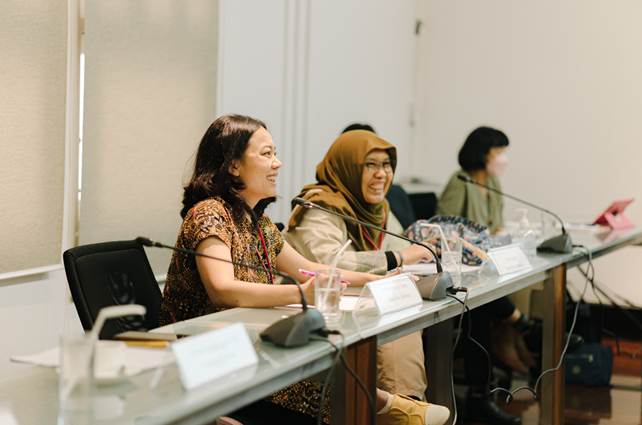
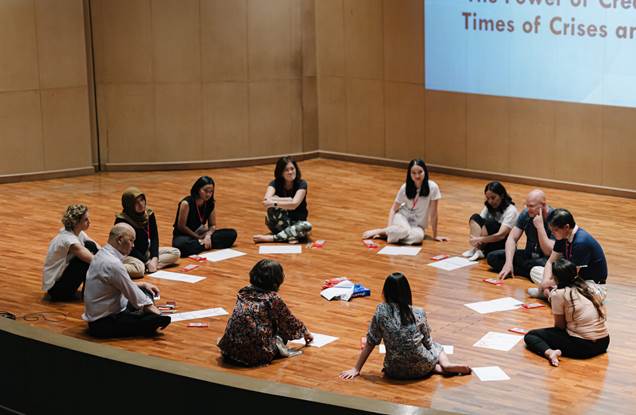
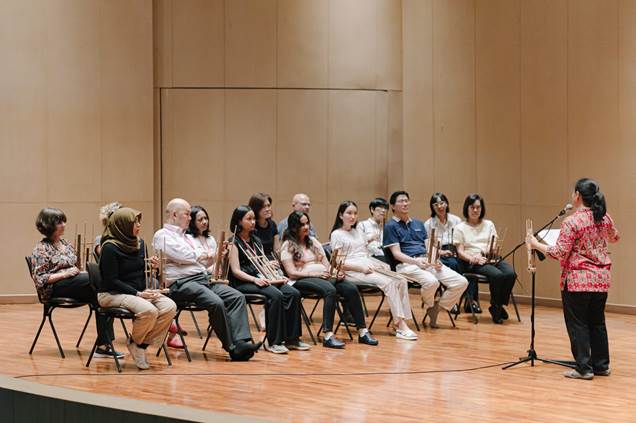
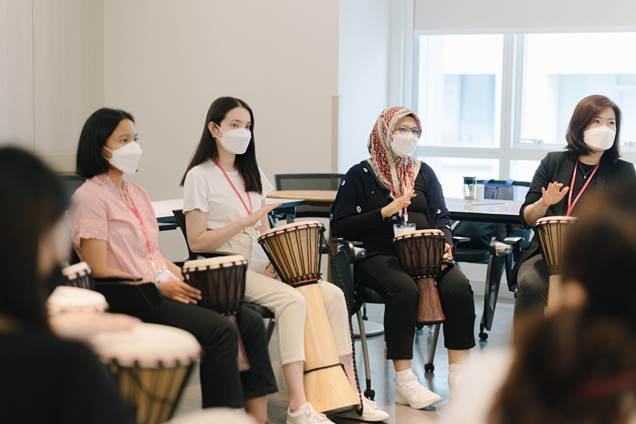
Participants from AUA member universities expressed keen interests in Chulalongkorn University’s Creative Art Therapy programs and supported the leadership of Chulalongkorn University in this field. Prof. Binson reported that WHO (Thailand) had proposed a partnership with Chulalongkorn University in establishing training courses in Creative Art Therapy. Preparations are underway, with the Faculty of Fine and Applied Arts developing an accredited curriculum to be submitted to WHO for support. She added that encouraging collaborations with experts and institutions concerned, that cut across the continent—from Japan as far as to Turkey—requires hard work and endless efforts. However, aiming at the goal of supporting and nurturing art therapists in the regions, Chulalongkorn University is excited to lead an initiative to start the Expressive Arts Therapy and Music Therapy programmes in Asia. It was highlighted that ensuring the cultural sensitivities, these two programmes will be tailor-made to deliver their unique and exceptional curricula with a high standard. In order to seek alliance and to support the students, it was agreed that providing scholarships is encouraged, which would ensure opportunity will be given to every potential future expert in the field.
On behalf of Chulalongkorn University, Prof. Binson concluded by saying, “With so much violence, abuse, and mental health issues happening in the world, the time of crises and uncertainties is now,” and expressed her deepest gratitude and sincere appreciation to all the participants in this conference, for the genuine interests and enthusiasm to develop the alliance in collaboration.